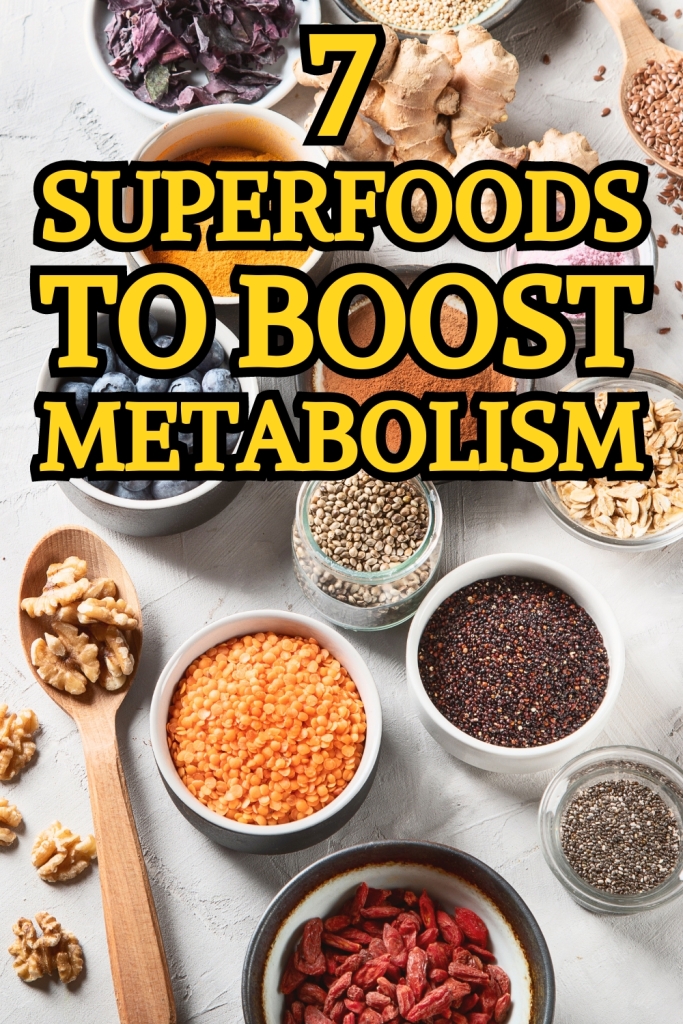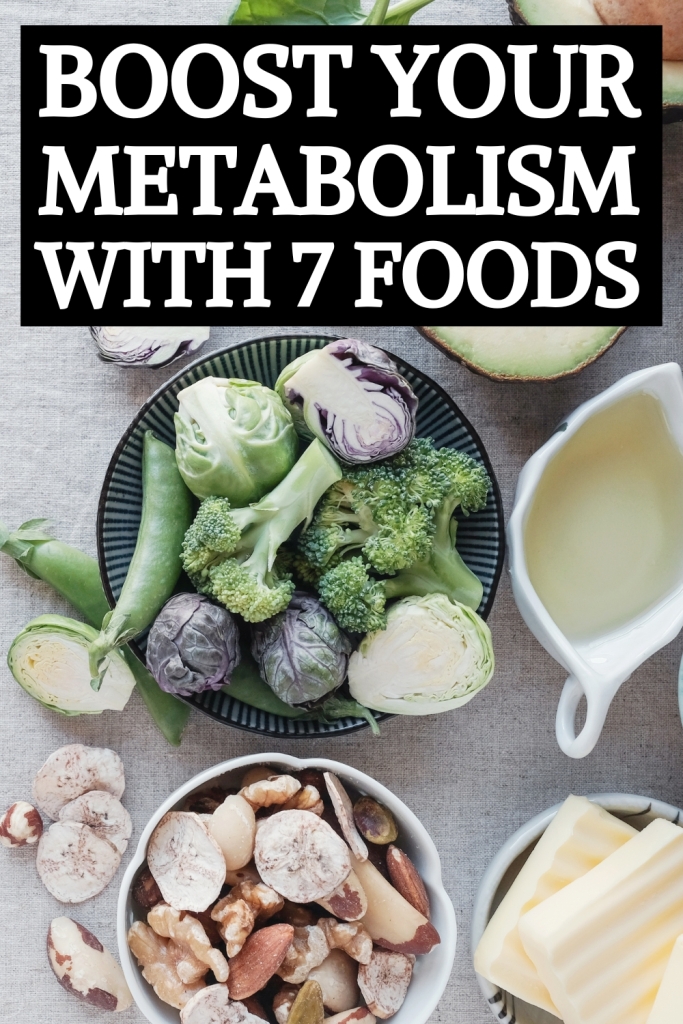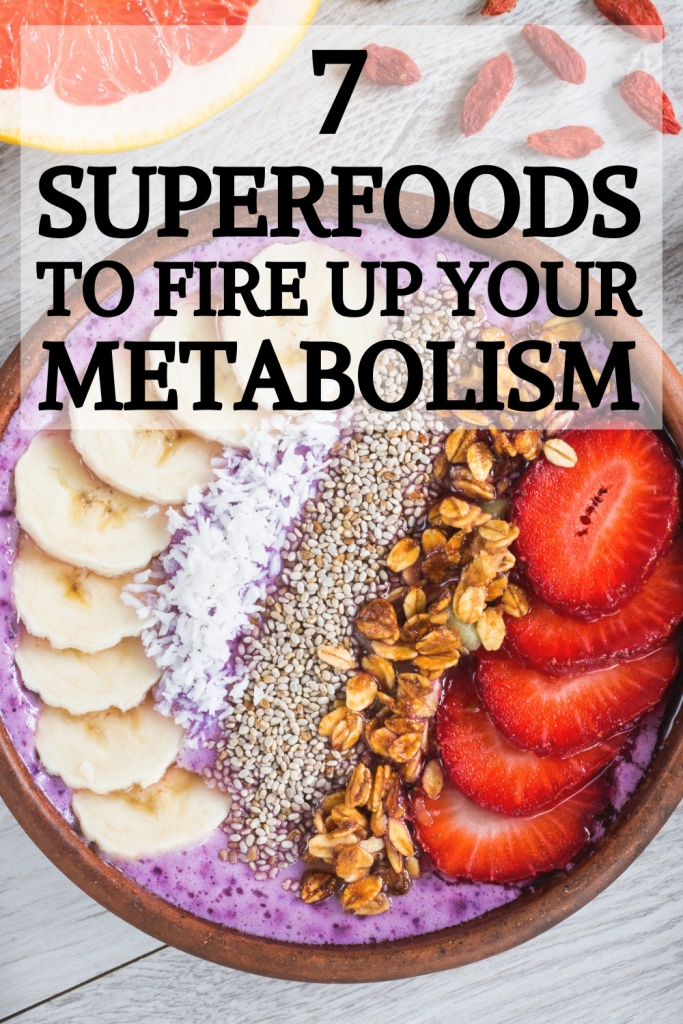In a world obsessed with fad diets and quick fixes, it's easy to forget the fundamental truth: a healthy metabolism is the cornerstone of sustainable weight management and overall well-being. While exercise and a balanced lifestyle play a vital role, the foods we choose to nourish our bodies can significantly impact our metabolic rate. Think of your metabolism as the engine that powers your body, converting the food you eat into energy. By incorporating specific superfoods into your diet, you can essentially fine-tune that engine, optimizing its performance and promoting efficient energy expenditure.
In this comprehensive guide, we'll delve into the science behind metabolism, explore the fascinating ways certain foods can give it a boost, and provide practical tips for integrating these powerhouse ingredients into your daily routine. Prepare to unlock the secrets of a revved-up metabolism and discover the delicious path to a healthier, more vibrant you.
The Metabolism-Boosting Power of Protein

When it comes to stoking your metabolic fire, protein reigns supreme. Compared to carbohydrates and fats, protein requires significantly more energy to digest, absorb, and utilize. This phenomenon, known as the thermic effect of food (TEF), essentially means that your body burns more calories simply by processing protein-rich foods. Studies have shown that the TEF of protein can be as high as 20-30%, compared to 5-10% for carbohydrates and 0-3% for fats.1
Lean Protein Sources
- Lean Meats and Poultry: Chicken breast, turkey, and fish are not only excellent sources of high-quality protein but also rich in essential amino acids, crucial for muscle building and repair.
- Eggs: A nutritional powerhouse, eggs offer bioavailable protein, healthy fats, and various essential vitamins and minerals, contributing to a boosted metabolism and sustained energy levels.
- Legumes: Lentils, beans, and chickpeas are superb plant-based protein sources, packed with fiber for enhanced digestion and satiety, making them ideal for enhancing metabolic rate and gut health.
Incorporating these lean protein sources into your meals can help increase your metabolic rate, preserve muscle mass, and promote satiety, keeping you feeling fuller for longer.
Spices: Flavor and Fire for Your Metabolism

Spices not only add flavor and zest to your dishes but also possess remarkable thermogenic properties. Thermogenesis is the process by which your body generates heat, and certain spices can naturally increase this heat production, leading to a temporary boost in your metabolic rate.
Thermogenic Spices:
- Chili Peppers: The capsaicin in chili peppers increases thermogenesis and fat oxidation, promoting calorie burning.2
- Ginger: Long used in traditional medicine, ginger may increase thermogenesis and suppress appetite, aiding weight management.3
- Turmeric: Curcumin, the active compound in turmeric, has been shown to increase thermogenesis and improve insulin sensitivity, supporting metabolic health.4
Adding these spices to your meals can offer both a flavor boost and a subtle metabolic nudge.
Green Tea and Coffee: Natural Metabolic Boosters

Both green tea and coffee, popular beverages enjoyed worldwide, offer more than just a flavorful pick-me-up. They contain compounds that can temporarily increase your metabolic rate and enhance fat oxidation.
Green Tea's Power
- EGCG and Fat Oxidation: The catechin EGCG in green tea increases the activity of enzymes involved in fat breakdown, leading to increased fat oxidation.5
- Green Tea and Exercise: Combining green tea consumption with exercise can further enhance fat burning, leading to increased calorie expenditure and improved body composition.6
Coffee's Kick
- Caffeine and Metabolism: Caffeine stimulates adrenaline release, which can increase metabolic rate and promote fat breakdown.7
- Coffee and Exercise: Similar to green tea, combining coffee with exercise can amplify its fat-burning potential, improving performance and leading to increased calorie expenditure.8
Incorporating green tea into your daily routine and enjoying coffee in moderation, particularly before workouts, can provide gentle yet effective metabolic boosts
Whole Grains and Fatty Fish: Nutritional Powerhouses

Whole grains and fatty fish, though seemingly different, share a common trait: they are packed with nutrients essential for a healthy metabolism
The Fiber Advantage of Whole Grains
- Fiber and Satiety: The high fiber content of whole grains, like oats, brown rice, and quinoa, promotes a feeling of fullness, reducing the likelihood of overeating.
- Fiber and Gut Health: Fiber acts as a prebiotic, nourishing beneficial gut bacteria, essential for optimal digestion and nutrient absorption, indirectly impacting metabolic rate.9
The Omega-3 Richness of Fatty Fish
- Omega-3s and Inflammation: Chronic inflammation can hinder metabolism. Omega-3s in fatty fish like salmon, tuna, and mackerel have anti-inflammatory properties that support metabolic health.10
- Omega-3s and Insulin Sensitivity: Omega-3s may improve insulin sensitivity, allowing for efficient glucose utilization, regulating blood sugar and preventing fat storage.10
Swapping refined grains for whole-grain options and including fatty fish in your diet at least twice a week are simple yet powerful steps towards a healthier metabolism.
Hydration and Metabolism: The Water-Rich Wonder of Fruits and Vegetables

Fruits and vegetables are not only packed with essential vitamins, minerals, and antioxidants but also boast a high water content. Staying hydrated is crucial for optimal metabolic function, as water is involved in various metabolic processes.11
The Role of Water
- Water and Metabolism: Water is essential for transporting nutrients, regulating body temperature, and eliminating waste products. Dehydration can slow down your metabolism and hinder your body's ability to function efficiently.
- Fruits and Vegetables for Hydration: Incorporating water-rich options like cucumbers, watermelon, and berries into your diet contributes to hydration and supports a healthy metabolism
Remember, keeping a water bottle handy and snacking on hydrating fruits and vegetables throughout the day are key to staying hydrated and supporting your metabolic processes
Beyond Superfoods: Lifestyle Factors for a Healthy Metabolism
While these superfoods offer a metabolic advantage, a holistic approach is key
Exercise: Regular physical activity, including both cardio and strength training, is crucial. Aim for at least 150 minutes of moderate-intensity or 75 minutes of vigorous-intensity exercise per week
Examples of Cardio: Brisk walking, jogging, cycling, swimming, dancing.
Examples of Strength Training: Lifting weights, bodyweight exercises, resistance bands
Sleep: Aim for 7-8 hours of quality sleep each night to support hormone balance and metabolic function
Stress Management: Chronic stress can disrupt metabolism. Find healthy ways to manage stress, such as yoga, meditation, or spending time in nature
Hydration: Aim to drink at least 8 glasses of water per day
Balanced Diet: Prioritize whole foods, lean protein, healthy fats, and plenty of fruits and vegetables. Avoid processed foods, sugary drinks, and excessive alcohol
Conclusion
Incorporating these metabolism-boosting superfoods, along with a balanced diet, regular exercise, and a healthy lifestyle, can optimize your metabolism, support your wellness goals, and enhance your overall vitality. Remember, it's about sustainable choices that nourish your body and fuel your metabolism for the long haul. Start by making small changes, listen to your body, and discover what works best for you. With dedication and consistency, you can harness the power of these metabolic marvels and embark on a path to a healthier, happier you!



References
- Effects of Varying Protein Amounts and Types on Diet-Induced Thermogenesis: A Systematic Review and Meta-Analysis
- Dietary capsaicin and its anti-obesity potency: from mechanism to clinical implications
- Ginger infusion increases diet-induced thermogenesis in healthy individuals: A randomized crossover trial
- Dietary curcumin restores insulin homeostasis in diet-induced obese aged mice
- Physiological effects of epigallocatechin-3-gallate (EGCG) on energy expenditure for prospective fat oxidation in humans: A systematic review and meta-analysis
- Does green tea extract enhance the anti‐inflammatory effects of exercise on fat loss?
- Does Caffeine Increase Fat Metabolism? A Systematic Review and Meta-Analysis
- Caffeine: a potential mechanism for anti-obesity
- Cereal Fibers and Satiety: A Systematic Review
- Marine-Based Omega-3 Fatty Acids and Metabolic Syndrome: A Systematic Review and Meta-Analysis of Randomized Controlled Trials
- Outcomes in Randomized Clinical Trials Testing Changes in Daily Water Intake: A Systematic Review





12 Responses
This article is interesting, but I’m a vegetarian. Can I still boost my metabolism with a plant-based diet? Most of the protein sources listed are animal products. Are there enough vegetarian-friendly options to make a difference? Also, is it really necessary to eat spicy foods? Because I really can’t handle the heat.
Hi Sarah, thanks for your comment! Absolutely, you can definitely boost your metabolism on a plant-based diet. While the article highlights lean meats, there are plenty of excellent vegetarian protein sources. Legumes like lentils, beans, and chickpeas are packed with protein and fiber, which are both great for your metabolism. You can also incorporate tofu, tempeh, edamame, quinoa, and nuts and seeds into your meals. Regarding spices, they can offer a slight metabolic boost, but they’re not essential. If you’re sensitive to spicy food, don’t worry! Focus on the other superfoods listed, like green tea, coffee (in moderation), whole grains, and staying well-hydrated with water and water-rich fruits and vegetables. The most important thing is to eat a balanced diet rich in whole, unprocessed plant-based foods.
I’ve heard that drinking too much coffee can be bad for you. How much coffee is considered “moderate,” and are there any potential downsides to relying on caffeine for a metabolic boost? Also, can drinking too much water be harmful? I want to make sure I am staying hydrated without overdoing it.
Hi Jessica, that’s a great point. While coffee can offer a temporary metabolic boost, it’s important to consume it in moderation. Most health experts recommend limiting your caffeine intake to around 400 milligrams per day, which is roughly equivalent to four 8-ounce cups of brewed coffee. However, individual tolerance varies, and some people may be more sensitive to caffeine than others. Overconsumption of caffeine can lead to side effects like anxiety, insomnia, and digestive issues. It’s also important to listen to your body and adjust your intake accordingly. As for water, while it is important to stay hydrated, it is possible to drink too much water. Drinking too much water can lead to a condition called hyponatremia, which is when the sodium levels in your blood become too low. Symptoms of hyponatremia can include nausea, headache, confusion, and fatigue. In severe cases, hyponatremia can be life-threatening. It is important to listen to your body’s thirst cues and drink water when you feel thirsty. You should also avoid drinking large amounts of water in a short period of time. If you are concerned about your water intake, talk to your doctor.
Okay, this all sounds great in theory, but I’m pretty sure my metabolism is slower than a snail in a molasses factory. I swear I gain weight just looking at a donut. Is there really hope for me? Also, “thermogenesis” sounds like something out of a sci-fi movie. Can you explain that in, like, normal human terms? And are we talking, like, ghost pepper levels of spicy for those spices to work, or can I still enjoy my food without crying?
Tiffany, I totally feel you on the slow metabolism struggle! It can be super frustrating. But trust me, there’s definitely hope! Think of your metabolism as a little engine that needs the right fuel to run efficiently. These superfoods can help rev it up, even if it’s currently running on fumes. Now, about “thermogenesis” – it’s basically your body’s way of creating heat. Certain foods, like those spices we talked about, can slightly increase this heat production, which means you burn a few extra calories. It’s like a tiny little furnace inside you! And don’t worry, you don’t need to set your mouth on fire to get the benefits. Even a little bit of chili, ginger, or turmeric can help. Start small and see how you go. Every little bit counts!
I’m all about this healthy lifestyle, but I’m also a major snacker. Are there any of these superfoods that work as good snack options? I’m also a bit skeptical about the coffee thing. Won’t that just make me jittery and mess with my sleep? I need my beauty rest to keep this metabolism happy, right?
Sarah, fellow snacker here, so I understand the struggle! The good news is, many of these superfoods are perfect for snacking. Hard-boiled eggs are a great protein-packed option, or you could have a handful of almonds (packed with healthy fats and protein!). Sliced apple with a sprinkle of cinnamon is another tasty choice. As for coffee, moderation is key. A cup in the morning can give your metabolism a little boost without necessarily impacting your sleep, and studies show that it actually promotes fat loss. Just avoid it too late in the day. And you’re absolutely right – sleep is crucial for a healthy metabolism, so prioritizing your beauty rest is a smart move! Maybe try some green tea in the afternoon instead? It has a gentler caffeine kick and those awesome EGCG compounds.
Okay, I’m intrigued! I’ve been trying to lose these last 10 pounds forever, and maybe my metabolism is just sluggish. I love the idea of spicing things up (literally!) to boost it. But how much chili pepper are we talking here? I can handle some heat, but I don’t want to be breathing fire all day! Also, does the green tea have to be hot, or can I make a big batch of iced green tea? Asking for a friend who lives in Arizona and needs to stay cool… 😉
Hey Grace, thanks for the great questions! I totally get the struggle with those stubborn pounds. Regarding the chili peppers, start small and see how you tolerate the heat. A sprinkle of red pepper flakes or a dash of your favorite hot sauce can go a long way. You definitely don’t need to turn into a fire-breathing dragon! And good news for your Arizona friend – iced green tea is just as effective! The key is the EGCG, which is present whether the tea is hot or cold. Just make sure you’re not loading it up with sugar, or that will defeat the purpose. Keep me posted on your progress!
This is a really informative article! I knew protein was important, but I didn’t realize just how much it impacted metabolism. I’m a vegetarian, so I’m always looking for good plant-based protein sources. You mentioned legumes, but what about things like tofu and tempeh? Also, is there such a thing as eating TOO much protein? I don’t want to overdo it, but I do want to see results!
Hi Lily, I’m glad you found the article helpful! You’re right; it’s amazing how much protein impacts our metabolic rate. As a vegetarian, you’re on the right track with legumes. Tofu and tempeh are also excellent sources of plant-based protein and can definitely contribute to a healthy metabolism. They’re also complete protein sources, containing all the essential amino acids. As for eating too much protein, it’s generally not a concern if you’re getting it from whole food sources, it can cause issues if you consume too much protein from processed foods such as protein shakes, always stick to natural protein sources. However, it’s always a good idea to listen to your body and adjust your intake accordingly. Aim for a balanced approach, and you should be good! Thanks for the comment!